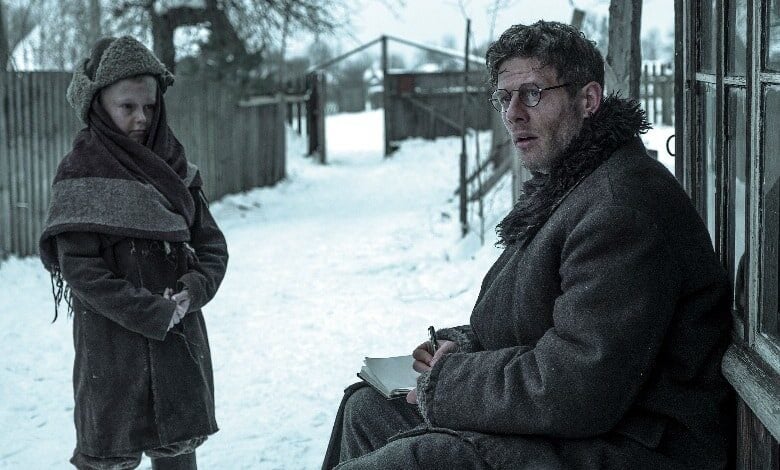
New York Times reporter Walter Duranty dominates “Mr. Jones,” the story of a journalist who revealed the truth behind Stalin’s so-called revolution.
Except the Pulitzer Prize-winner isn’t the hero of this tale. Freelance journalist Gareth Jones opened the world’s eyes to the famine, dubbed the Holodomor, occurring under Stalin’s watch.
The title character is the film’s focus, but it’s impossible to watch “Mr. Jones” and not connect Duranty’s duplicity to the Fake News all around us.
It turns a solid, if unspectacular film into an essential one.
James Norton stars as Jones, a Welsh journalist eager to interview Soviet leader Joseph Stalin. Jones previously sat down with Adolf Hitler, so snagging face time with Stalin to talk about the growing Nazi threat shouldn’t be hard.
Yes, the film’s protagonist is a mite naive when the story opens, but he’s a fast learner. He arrives in Moscow but realizes he won’t be chatting up Stalin any time soon. The Soviet machine, along with fellow journalist Walter Duranty (Peter Sarsgaard), wine and dine Jones to distract him from his mission.
Undaunted, Jones makes his way to Ukraine where he witnesses the truth behind Stalin’s glorious regime.
- Starving citizens
- Piles of dead bodies
- Forced labor
- Journalists willing to cover it all up
“There are those who’d like to see our revolution fail,” says Duranty, one of many chilling lines. Other elements prove maddeningly amplified, from a cannibalism scene to journalism debates far too on the nose for comfort.
“I just didn’t think Duranty had an agenda,” one character says. Sarsgaard, bringing an oily charm to Duranty, reveals the moral sacrifices necessary to maintain his access. It’s a quietly monstrous turn.
Norton cuts a dashing figure as Jones, but he’s idealized to a fault. He’s fearless and smart, morally upright and strong. Polish director Agnieszka Holland makes him darn near perfect, when a stumble or two might have proved more compelling.
Norton, to his credit, brings a bruised humanity to the part.
It’s not like Holland is taking a straightforward path to retelling Jones’ story. She uncorks a litany of devices to embellish Jones’ heroism. The best gambit? Filming the Ukrainian scenes in stark black and white.
RELATED: ‘The Death of Stalin’ Gives Communism the Skewering It Deserves
Other tics prove less sound, like clumsily inserting George Orwell into the story. Yes, the celebrated scribe fed off Jones’ reportage for “Animal Farm,” but his appearances here serve only to distract.
A quasi-love story involving a conflicted journalist (Vanessa Kirby) similarly feels like a diversion from the main story. But what a story it is! The film runs two hours long after some significant edits, but these asides gobble up precious screen time. Jones’ life deserves better.
FAST FACT: Here is how The Atlantic captured Stalin’s atrocities – “At least 5 million people perished of hunger all across the Soviet Union. Among them were nearly 4 million Ukrainians who died not because of neglect or crop failure, but because they had been deliberately deprived of food.”
It’s likely the creative team behind “Mr. Jones” didn’t have CNN and co. in mind while making their feature. Duranty and his co-horts actively covered up, if not invented, news stories to placate their Soviet minders. At least they worked under duress. One false report and the Soviet authorities might make life hard for them.
Or worse.
Today’s Fake News warriors blur the truth for their own ideological ends – and probably a juicy Christmas bonus.
It’s a shame more people know who Walter Duranty was than Gareth Jones. “Mr. Jones” might fix that cultural blight. The film also reminds us why good journalism matters and how much is lost without it.
HiT or Miss: “Mr. Jones” isn’t as arresting as you’d hope, but it’s a critical story that connects to today’s sorry excuse for journalism.
